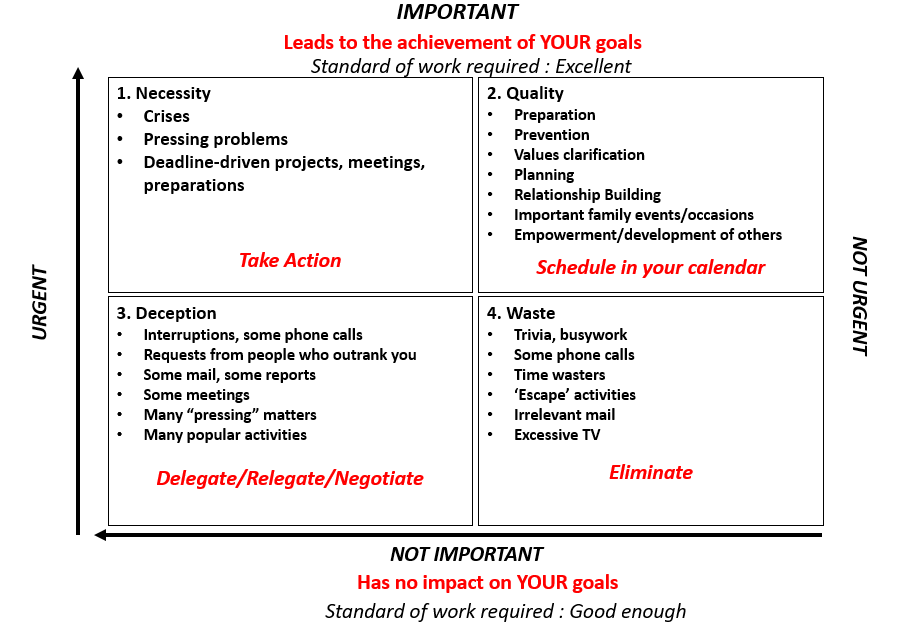
I think the most common coaching topic that comes up in my coaching practice is time management. It is a fairly broad topic, and comes up in a variety of ways that may not, on the face of it, seem as if they relate to time management. Consider the following examples:
- The team member who regularly works late because much of her work day is spent helping other people and taking care of their priorities – so her own deliverables are taken care of after hours. This person has a boundaries issue, but it becomes visible because of its impact on her working hours;
- The colleague who bounces around from unfinished task to unfinished task and has 10 windows open on his screen because he is distractible and has not developed the habit of task completion;
- The person who drops a high impact deliverable that she is working on to attend to a request from her boss’s boss – a request that makes absolutely no impact on her own KPIs, and which causes her to miss a critical deadline. This person lacks the assertiveness to clarify and manage the expectations of people in positions of power;
- The team member who spends all his time in meetings – some of which do not require his personal attendance – and then works late regularly and often misses important family and parental occasions resulting in immense guilt and a sense of loss around these key occasions. He has not clarified his key priorities, probably accepts meetings mindlessly and is also not using the resources available to him.
1. Consider what you have on your plate in terms of the following dimensions:
a. Importance - there is only one thing that makes a task important: there is direct line of sight between the task and your goals. Not your boss’s goals, not your CEO’s goals, not your global head office’s goals. Your goals! And this includes your personal goals, like taking care of your health, being a good parent and a supportive spouse. This implies that you have tasks that are important (to you) and tasks that are not important (to you). Now before you get all anxious and stop reading, I am not about to suggest that you will not do those tasks. I am simply going to encourage you to think about them differently.
b. Urgency – the more pressing the deadline for the task, the greater the urgency.
2. Once you have decided where each task goes, you can decide how to tackle them.
The diagram below explains how to identify and deal with what is on your plate, and to allocate it to the correct quadrant.

These are tasks which must happen today. There is direct line of sight between these tasks and your own goals. Some of these will be surprises in the form of crises or emergencies, but many of these will have been coming up, so you should be ready to take the necessary action. If you feel as if you are lurching from crisis to crisis, then you are probably not spending enough time in Quadrant 2.
2. Quadrant of Quality – Important but not Urgent
These are tasks that contribute to the quality of your work and life. Every single Quadrant 2 activity is focused on the future. At work these activities include:
- the time spent developing new stuff and improving old stuff – innovation and continuous improvement should keep you out of crisis management, and if you are constantly in crisis management it is a strong indicator that you are not spending enough time on quadrant 2 work;
- the time spent preparing and preventing – this is about being organised, focused on quality and on top of things;
- time spent on strategy – this is the thinking and designing work that keeps you ahead of the game and ensures that you are not relentlessly bogged down in day-to-day operational busyness;
- time spent building relationships and developing people – you do these things in the present so that you can call on them in the future;
- time spent planning – daily for tomorrow; weekly for the coming week; monthly to make sure preparation time is blocked out in your calendar.
Outside of work, quadrant 2 tasks relate to key personal goals, events and concerns – some of which have to be attended to during working hours. Attending the gala in which your daughter is swimming qualifies; as does going to the gynae with your spouse for a pregnancy scan. Taking care of your health through regular exercise and physical exams also qualifies.
Because there is no pressing deadline on your Quadrant 2 activities, they often get bumped aside in favour of tasks with greater urgency – Quadrant 3 is the biggest culprit (see below). For this reason, it is important that you book out chunks of time in your calendar to take care of your Quadrant 2 activities. Consider these “appointments” as a matter of integrity. You wouldn’t dump an appointment with a client for weak reasons, would you? You wouldn’t do the same to a person of influence in your working world, would you? So why would you do it to your team members, your family and yourself? A commitment is a commitment. If you have blocked off time and you absolutely have to do something else during that time, then reschedule – and honour that appointment.
The first part of the day should be spent in Quadrants 1 and 2 – this is when your energy is at its best and should be used on work that serves your objectives. Having good boundaries is critical to ensuring that your most valuable part of the day isn’t gobbled up by other people’s priorities. This includes good personal boundaries – like developing the habit of task completion. You do your best work when you get into a state of flow (google it). It takes about 20 minutes to get into a state of flow – and every time you shift your focus to another task you add another 20 minutes to the task, and take away from the quality of the work.
These are tasks that make no contribution to your goals, but they shout so loudly that you are deceived into treating them as important. It is your Quadrant 3 activities that erode the time that should be spent in Quadrant Two. It is important to defend yourself from them. These activities include:
- Many of your emails;
- Interruptions to address someone else’s concerns;
- Requests from people who outrank you (your boss’s boss or the global head office) – especially last minute requests or demands;
- Many of the meetings to which you are invited;
- Many of the reports that you compile.
There are 3 main tactics for dealing with activities in Quadrant 3:
- Delegate: are there meetings that you do not have to attend yourself? Can you ask a team member to deputise as part of their own development or because they are as capable as you of representing the team? “I won’t be attending that meeting myself. I am sending Douglas. He has the authority to engage on this subject and contribute to the decisions you will make.”
- Relegate: this means that you move these tasks to a later part of the day or you give them a lower standard of attention. For example, it is appropriate to look through your emails at the beginning of the day – not to clear them, but to establish if there is anything that must go into Quadrant 1. All the other emails can be relegated to later parts of the day. Perhaps you can attend to some emails every couple of hours – in between your more important work. And please switch off your email alerts! You don’t need them. There is no danger that you will not get to your emails – but if you have an alert popping up on your screen, and a vibration on your wrist and a ping from your cell phone, all you are doing is raising your blood pressure and exacerbating your ADD! Also please remember that the vast majority of your emails can be dealt with via a quick one-liner – most often it really is not necessary to write an email as a formal business letter!
- Negotiate: this is about managing other people’s expectations. When you receive a request (or demand) from a person who outranks you, it is completely appropriate to say “Sure I can do that for you. Can I get it to you by Friday?” You do not have to explain why. And when you get that 4.00pm email for the piece of work that is required back by 9.00am the next day, it is fine to say “Got your email. I can get that work to you, but it won’t be by 9.00am. It will be with you by the end of the day.” Again, no reason is required.
It is not mannerly or collegial to assume that someone has nothing better to do with their evening than sort out someone else’s bad planning. And if the person making the request really needs the work urgently, they can come back to you and politely ask you to pull a rabbit out of the hat. You will also have made the point that it should not be taken for granted that you can attend to last minute requests.
The same is true of interruptions. If you are busy with an Important task, it is fine to say to your colleague “I need to finish this (you don’t have to say what it is). Can we talk at 2.00?” And then be sure to be available when you said you would be.
Remember that the standard required for activities that make no contribution to your goals is good enough. Do not over-engineer these tasks. They do not deserve or require a higher standard. Accurate is important, but perfect is not.

These are typical time wasters. Some have to be done, like filing (does anyone still keep files of papers?). Many of them make no contribution of any kind. If you really need a break, go for a walk – with a colleague, even. That is real restoration (combined with relationship-building) – playing Candy Crush is not. Eliminate these tasks if you can. Don’t allow them to pile up if you can’t.
Using the Four Quadrants in Coaching
- Explain the model. While doing so, ask your team member for examples of tasks and activities that fit into each quadrant – this will make it real for them. Also ask them which of the traps they typically fall into. Use a whiteboard or draw on a piece of paper – make the explanation as interactive as you can.
- Once you have explained the model, ask what small changes will make the biggest difference to their ability to use the time available more effectively.
- Now get a commitment to specific actions – you can follow up on these in the next session. And don’t fall for the “I didn’t have time” excuse!


 RSS Feed
RSS Feed


